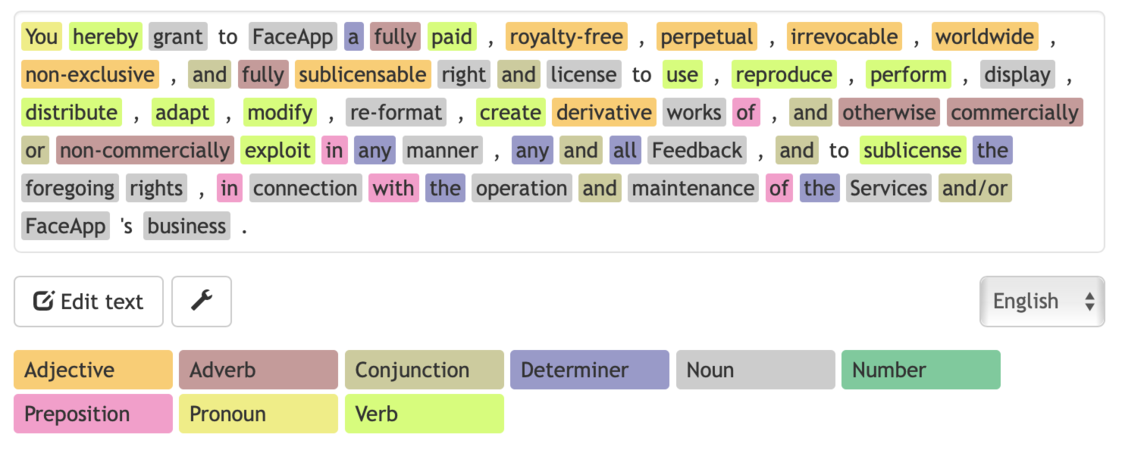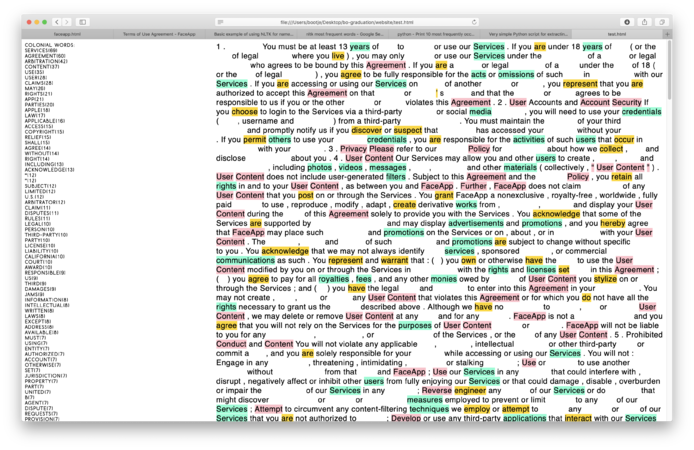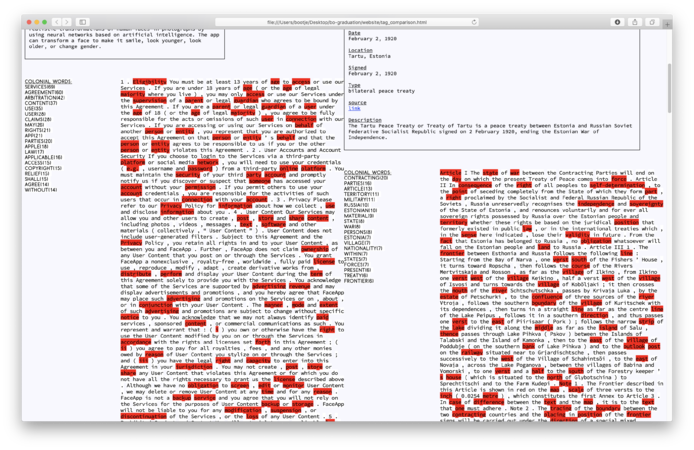User:Bohye Woo/Degrees of coloniality in Terms of Service
1 — (title yet decided) — general description
I'm building a modern-colonial text publishing archive, a series of word analysis that reveals the modern-colonial contexts in 'Terms of Service (ToS)'. ToS is a modern working contract in digital colonial society, where big companies are dominating the power structures via ToS to deceive users. My project introduces how modern digital colonialism is showing in digital society by mapping out the whole architecture of language in ToS.
The role of my project
The role is to...
- contribute a platform of reading ToS. In doing so, it questions what does it mean to provide ToS in the digital corporate society.
- question the concept of digital colonialism by providing visualization of ToS language as a modern-colonial tool to deceive users.
- analyse ToS from major tech companies to investigate how particular terms are being used in the specific context of ToS. Because ToS platforms have different tones of voice, different words being used. How does the platforms have modern-colonial aspects in ToS?
- examine what is modern-colonial language by taking a closer look on words within the realm of ToS. This provides categorization of modern-colonial language into digital colonial glossary.
- archive. It is evident that not much of digital material will survive (Zelkowitz, 2003). Archiving is important in digital age as a preservation tool because of perpetual changes in digital platform. My project archives related informations about digital colonialism including news articles, videos, books, tweets ... to proffer knowledges I gleaned from the web. The archive will contain different analyzations on the modern-colonial words and contexts.
(Zelkowitz, 2003): Advances in Computers: Information Repositoriesedited by Marvin Zelkowitz: https://books.google.nl/books?hl=en&lr=&id=xqvv7yqtr2kC&oi=fnd&pg=PA1&dq=importance+of+knowledge+archiving&ots=9NU6J-zv88&sig=2pkfx30iXkDgFS4-wLsqT9iVs8Y#v=onepage&q=importance%20of%20knowledge%20archiving&f=false)
Important aspects
As a contract aspect:
- Lots of treaties were sneakily made in colonial era to be lucrative, to get profit out of their colony. Same goes for the ToS or privacy policies in digital corporate society where the big companies are dominating the power structures via ToS to deceive users
As a language/linguistic aspect:
- Language as a colonial tool: Treaties in colonial times and Terms of Service in modern time both are to control the power structure. it shows a way to indoctrinate/manipulate the colonize subject by language.
- Polarity of calming language: How specific words can play as colonial words? Using their comfort language become a colonial language. Comforting language for the company that are using highly polarized terms sometimes obfuscates or conceal users labour to deceive them.
- Language as a colonial waterway: Shiproute in colonial times that used to sail to exchange goods, extract sources, and import labours. Language itself as a medium by which to interface with the colonizer.
- Language as a colonial language: using a language that you're porting into the colony in order to be able to extract the resources. (ex, Japanese forced Korean to speak Japanese)
2 — Terms of Services
These companies are officially not a colony, but in a pratical term: a colony. There is a relationship that is unfair regardless what their intention is.
FaceApp
Name of Service: FaceApp
Type: Image editing
Initial release date: December 31th, 2016
Website: https://www.faceapp.com/privacy-en.html / https://www.faceapp.com/terms-en.html
Description: FaceApp is a mobile application for iOS and Android developed by Russian company Wireless Lab. The app generates highly realistic transformations of human faces in photographs by using neural networks based on artificial intelligence.
TikTok
Name of Service: TikTok
Type: Video Sharing
Initial release date: September, 2016
Website: https://www.tiktok.com/legal/privacy-policy?lang=cn#privacy-row
Description: TikTok is a Chinese video-sharing social networking service owned by ByteDance, a Beijing-based company founded in 2012 by Zhang Yiming. It is used to create short dance, lip-sync, comedy, and talent videos. ByteDance first launched Douyin for the China market in September 2016.
PokemonGo
Name of Service: PokemonGo
Type: Augmented reality, Location-based game
Initial release date: July 6, 2016
Website: https://www.pokemon.com/us/privacy-notice/
Description: Pokémon Go is a 2016 augmented reality (AR) mobile game developed and published by Niantic(American software company) in collaboration with The Pokémon Company for iOS and Android devices.
Snapchat
Name of Service: Snapchat
Type: Photo sharing, Instant messaging, Video chat Multimedia
Initial release date: July 8, 2011
Website: https://www.snap.com/en-GB/terms/ https://www.snap.com/en-GB/privacy/privacy-policy/ / https://www.snap.com/en-GB/terms/
Description: Snapchat is a multimedia messaging app used globally, created by Evan Spiegel, Bobby Murphy, and Reggie Brown, former students at Stanford University, and developed by Snap Inc., originally Snapchat Inc.
Netflix
Name of Service: Netflix
Type: Entertainment, Online video streaming
Initial release date: August 29, 1997
Website: https://help.netflix.com/legal/termsofuse / https://help.netflix.com/legal/privacy
Description: Netflix is an American media-services provider and production company headquartered in Los Gatos, California. The company's primary business is its subscription-based streaming service which offers online streaming of a library of films and television programs, including those produced in-house.
Amazon
Name of Service: Amazon
Type: E-commerce
Initial release date: July 5, 1994
Website: https://www.amazon.com/gp/help/customer/display.html?ie=UTF8&nodeId=508088&ref_=footer_cou / https://www.amazon.com/gp/help/customer/display.html?ie=UTF8&nodeId=468496&ref_=footer_privacy
Description: Amazon is an American multinational conglomerate technology company based in Seattle. It focuses on e-commerce, cloud computing, digital streaming, and artificial intelligence.
Sony - Aibo
Name of Service: Amazon
Type: Entertainment
Initial release date: 1998
Website: https://us.aibo.com/terms/aibo-privacy.html / https://us.aibo.com/terms/pdf/aibo-privacy.pdf / https://us.aibo.com/terms/pdf/terms-ai.pdf
Description:AIBO is a series of robotic pets designed and manufactured by Sony. Sony announced a prototype Aibo in mid-1998 in Japan.
Process
Tools
1. NLTK will help to analyse and categorise the words from ToS.
- NLTK website http://www.nltk.org/
- NLTK Book: https://www.nltk.org/book/ / https://www.strehle.de/tim/weblog/archives/2015/09/03/1569
- POS tag: A Part-Of-Speech Tagger (POS Tagger) is a piece of software that reads text in some language and assigns parts of speech to each word (and other token), such as noun, verb, adjective, etc.
2. To be added more...
How to categorise colonial words?
STEP 1
Using a Standford Log-linear Part-Of-Speech Tagger in NLTK. A Part-Of-Speech Tagger (POS Tagger) is a piece of software that reads text in some language and assigns parts of speech to each word (and other token), such as noun, verb, adjective, etc. (https://nlp.stanford.edu/software/tagger.shtml)
The list of part of speech
- MD = would, could...
- RB = adverb 'very', 'slightly'...
- VB = verb
- JJ = adjective 'big'...
- NN = noun
- CC = coordinating conjunction 'and', 'or'...
- PRP = personal pronoun 'I', 'he', 'she'...
... more and more
Project overview
https://www.cnet.com/how-to/amazon-and-google-are-listening-to-your-voice-recordings-heres-what-we-know/
https://www.cnet.com/news/faceapp-says-its-not-uploading-all-your-photos/
https://www.cnet.com/news/faceapp-privacy-concerns/
https://twitter.com/rycrist/status/1151479283661115392
https://fossbytes.com/tiktok-is-spyware-reddit-ceo-steve-huffman/
https://www.wired.com/story/faceapp-privacy-backlash-facebook/
https://www.cnet.com/news/yes-the-robot-dog-ate-your-privacy/
https://mashable.com/2014/07/24/terms-of-service-secrets/?europe=true
https://www.extremetech.com/extreme/285823-most-website-terms-of-service-are-functionally-incomprehensible-to-americans



